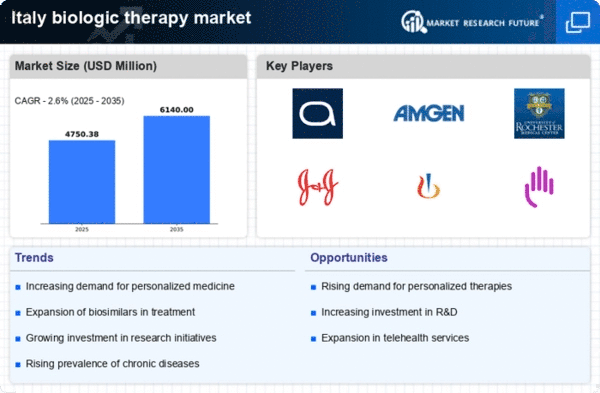Advancements in Biotechnology
Technological advancements in biotechnology are significantly influencing the biologic therapy market. Innovations in genetic engineering, monoclonal antibody production, and cell therapy are enhancing the development of new biologics. In Italy, the biotechnology sector has seen substantial growth, with investments reaching approximately €1.5 billion in recent years. This influx of capital is fostering research and development initiatives that aim to create more effective biologic therapies. As a result, the biologic therapy market is likely to benefit from a pipeline of novel therapies that can address unmet medical needs. The integration of cutting-edge technologies is expected to streamline the production processes, reduce costs, and improve accessibility to biologic treatments.
Rising Healthcare Expenditure
Rising healthcare expenditure in Italy is a critical factor driving the biologic therapy market. As the government allocates more resources to healthcare, there is an increasing focus on innovative treatments that can improve patient outcomes. In recent years, healthcare spending has grown by approximately 4% annually, reflecting a commitment to enhancing the quality of care. This trend is likely to benefit the biologic therapy market, as healthcare providers are more inclined to invest in advanced therapies that demonstrate efficacy. The increased funding for healthcare initiatives is expected to facilitate the adoption of biologics, ultimately leading to a more robust market landscape.
Supportive Healthcare Policies
Supportive healthcare policies in Italy are playing a crucial role in shaping the biologic therapy market. The Italian government has implemented various initiatives aimed at promoting the use of biologics, including reimbursement schemes and incentives for research. These policies are designed to enhance patient access to innovative therapies, thereby driving market growth. For instance, the Italian Medicines Agency (AIFA) has established frameworks that facilitate the approval and reimbursement of biologic treatments, ensuring that patients receive timely access to necessary therapies. This supportive regulatory environment is likely to encourage pharmaceutical companies to invest in the biologic therapy market, fostering a competitive landscape that benefits both patients and healthcare providers.
Growing Demand for Targeted Therapies
The increasing demand for targeted therapies is a significant driver for the biologic therapy market. Patients and healthcare professionals are increasingly seeking treatments that offer precision and reduced side effects compared to traditional therapies. In Italy, the shift towards personalized medicine is evident, with a growing number of patients opting for biologic treatments that are tailored to their specific conditions. This trend is supported by clinical evidence demonstrating the effectiveness of biologics in managing complex diseases. The biologic therapy market is thus likely to experience robust growth as more patients and providers recognize the advantages of targeted therapies, leading to a broader acceptance and utilization of biologic products.
Increasing Prevalence of Chronic Diseases
The rising incidence of chronic diseases in Italy is a pivotal driver for the biologic therapy market. Conditions such as rheumatoid arthritis, psoriasis, and various cancers are becoming more prevalent, necessitating advanced treatment options. According to recent health statistics, chronic diseases account for approximately 70% of all deaths in Italy, highlighting the urgent need for effective therapies. Biologic therapies, known for their targeted action and efficacy, are increasingly being utilized to manage these conditions. This trend is likely to continue, as healthcare providers seek innovative solutions to improve patient outcomes. The biologic therapy market is thus positioned to expand significantly, driven by the demand for specialized treatments that address the complexities of chronic diseases.
















